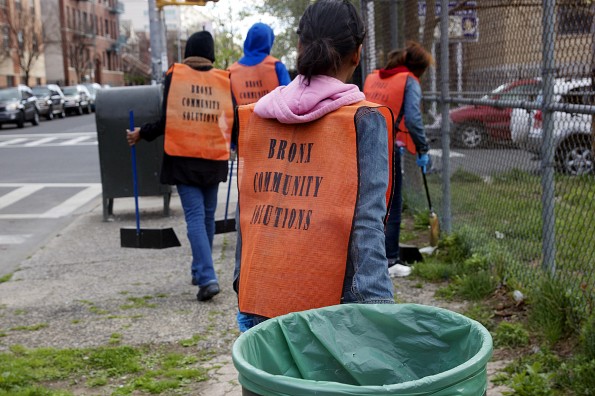In the 1960s and ‘70s, New York was plagued by high crime rates. In response, the state passed a series of laws that stiffened penalties for teenage offenders. New York is one of only two states that treats 16-year-olds as adults in criminal cases. Now the pendulum may be swinging the other way. Celia Llopis-Jepsen reports.
LLOPIS-JEPSEN: Let’s say a 15-year-old steals an iPhone. If the police apprehend him, the first thing they have to do is call his parents. But if he’s 16, he goes to the precinct house, then to central booking, and if he doesn’t make bail, he goes to Rikers Island.
All that exposure to the criminal justice system may be making things worse. Jeffrey Fagan is director of research at the Center on Crime, Community and Law at Columbia University.
FAGAN: The research evidence is very strong and very conclusive … that when you … prosecute teenagers as adults … they are far more likely, maybe one and a half to two times more likely to be rearrested than the same kid, pound for pound, who’s treated in the juvenile court. (00:10)
LLOPIS-JEPSEN: In other words, treating 16 year olds as adults is having the opposite effect of what legislators intended.
FAGAN: I’m hard pressed to find a reason why we want to maintain even fragments of the current system by retaining original jurisdiction in the adult court for juveniles. (00:08)
LLOPIS-JEPSEN: New York State Chief Judge Jonathan Lippman agrees. Next week, he will send a proposal to legislators to set the age of criminal responsibility at 18.
New York arrests more than 40,000 16 and 17-year-olds every year. The vast majority are arrested for nonviolent crimes. Under Lippman’s proposal, those teens would be treated as juveniles.
Retired judge Michael Corriero advised Lippman on the proposal. Corriero served on the bench for 28 years and specialized in cases with minors. He says 16 year olds are too young to understand the consequences of their actions.
CORRIERO: Have you ever been 16? Have you ever done anything that … you didn’t want to do because you … were concerned about your image? (00:09)
LLOPIS-JEPSEN: Under Lippman’s proposal, nonviolent juvenile cases would go to newly created youth courts, where judges would have a wider range of sentencing options. They could order mental health care, for example. Or counseling, tutoring, or community service.
Teens brought before these courts would not end up with criminal records that would follow them for life. That means they wouldn’t be disqualified for student loans or certain jobs, and that their families couldn’t be expelled from public housing.
Lippman is already testing the waters. Early this year, he launched preliminary versions of the youth courts in a few counties. One of those pilots is in the Bronx.
Teens who participate can end up doing community service or attending classes at Bronx Community Solutions, an alternative sentencing project.
In the Mt Eden neighborhood yesterday, three boys and two girls were sweeping the streets around the West Bronx Recreation Center under the watchful eye of a supervisor.
AMBI: “Just walk around and pick up what you see. Try to make the neighborhood look nice and decent.” (00:15 of talking, ambi)
LLOPIS-JEPSEN: At the edge of the action, community service coordinator Moises Reyes looked on. He says he sees a difference even with teens who participate only for a few days.
REYES: They believe they’re doing something positive. When they come in the morning you know they come very serious, but at the end of the day you know when you reach somebody because they give you a handshake and they say thank you. (00:20)
LLOPIS-JEPSEN: Lippman’s proposal is likely to face some opposition in Albany. Some county officials worry that the law will shift significant costs to county governments, in particular to their probation departments. They also say a lot of counties don’t have the community and social services infrastructure they need to make the proposal work. Without that, they say, New York State would still be failing kids.
Lippman is looking for a sponsor in Albany for his proposal.
Celia Llopis-Jepsen, Columbia Radio News.



